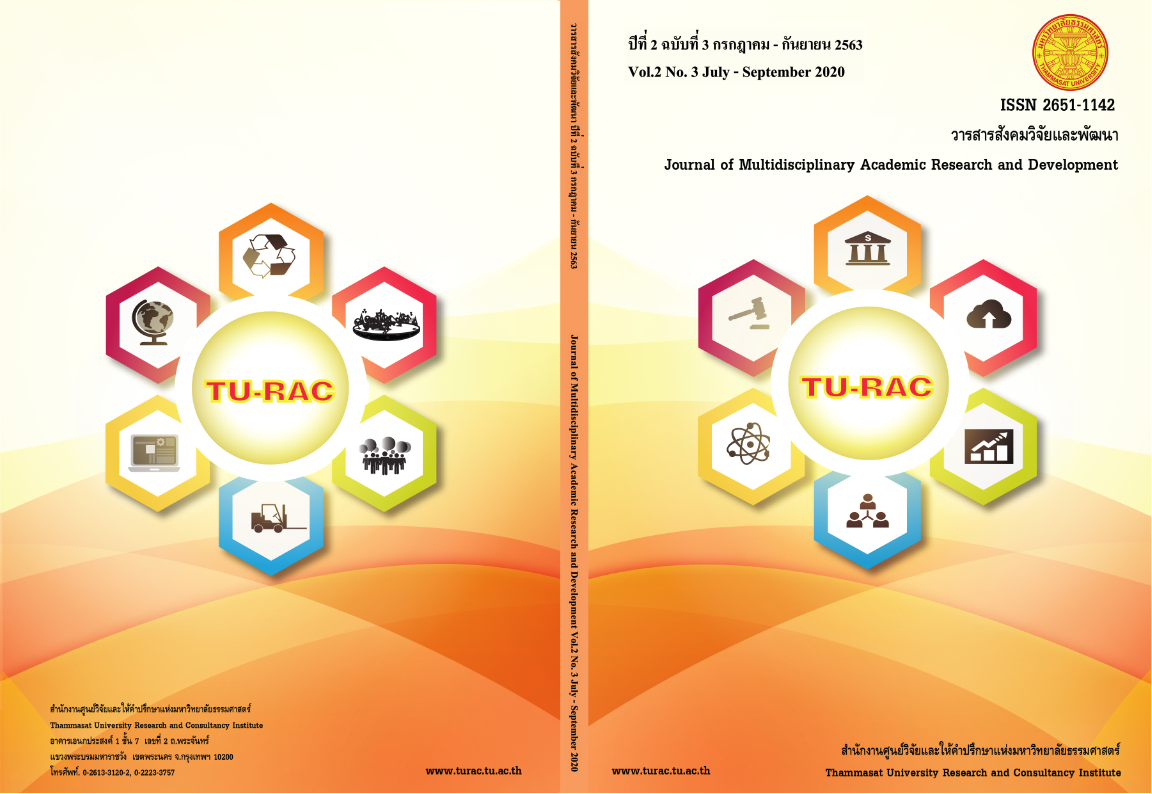The Sufficiency economy alternatives Survival in the Crisis of Covid-19
Keywords:
Sufficiency economy, Covid-19Abstract
The outbreak of the COVID-19 virus, which began in China at the end of 2019 and spread to Thailand in early 2020. In addition to causing a lot of people infected and dead, the result of the Lock Down announcement and many other establishments to control the spread of the disease. Also makes a huge impact on the economy, society and food security around the world. The world economy has experienced the highest record, with the contraction of -6 to -7.6% expected. There will be more than 265 million people at risk of famine in 2020. For Thailand, it is predicted that the Thai economy in 2020 will be reduced as well. Which various institutions have estimated the Thai economic growth by 2020 to be negative at least -3 to -10.3%, this causing unemployment in April 2020 more than 600,000 people causing incidents of labor and social instability. People are paranoid, fear of strangers, racism, Chinese and East Asian expulsion and mayhem, Food and consumer products are stockpiled, product prices rise. Measures taken by the government to help from the poor level to the financial institutions and large organizations. Helps alleviate the suffering to the public to a certain extent. But in the long run, the government is unable to distribute people's tax money for all life. Self-reliance is therefore essential. People must adjust their lifestyles to suit the economic and social conditions. Reduce unnecessary costs, save frugal, and return to living sufficiently to eat as the royal initiative on the sufficiency economy that “...National development needs to be done in a hierarchy. The foundation must be built is to have enough to eat enough for the majority of the people first by using methods and equipment that are economical but technically correct. When having sufficient basic security and practiced, then gradually build, gradually enhance prosperity and higher level of economic status in the following order...” To look back at things that Thailand is already good and applied it seriously. May be another option Thailand's survival in the possible escalation of the Covid-19 crisis.
References
กองบรรณาธิการ. (2563). “เศรษฐกิจพอเพียง” ปรัชญาชวนตระหนักคิด ช่วงวิกฤต COVID-19. สืบค้นเมื่อสืบค้นเมื่อวันที่ 27 กรกฎาคม
จาก https://aommoney.com/stories/กองบรรณาธิการ/เศรษฐกิจพอเพียง-ปรัชญาชวนตระหนักคิด-ช่วงวิกฤต-covid-
/3187#kd44oxfv30.
ดนุชา สินธวานนท์. (2563). ปรัชญาเศรษฐกิจพอเพียง ทางเลือกที่เหมาะสมสังคมไทยในทุกวิกฤติ. สืบค้นเมื่อวันที่ 28 กรกฎาคม 2563
จาก https://siamrath.co.th/n/171049.
ดร. ยงยุทธ แฉล้มวงษ์, ดร. สมชัย จิตสุชน และเกศินี ธารีสังข์. (2563). ผลกระทบ โควิด-19 ต่อตลาดแรงงานไทย: ข้อมูลเชิงประจักษ์
“TDRI Policy Series on Fighting Covid-19”. สืบค้นเมื่อวันที่ 27 กรกฎาคม 2563 จาก https://tdri.or.th/issue/covid-
/.
ทัศนีย์ วีระกันต์. (2563). ปั้นประเด็นร้อนสู่สมัชชาสุขภาพฯ 13 ‘ความมั่นคงทางอาหารในภาวะวิกฤต’. สืบค้นเมื่อวันที่ 28 กรกฎาคม
จาก https://www.nationalhealth.or.th/node/3128.
ประชาชาติธุรกิจออนไลน์. (2563). ความมั่นคงทางอาหารของไทย น่าห่วงหรือไม่ในภาวะที่โลกเสี่ยงขาดแคลน. สืบค้นเมื่อวันที่ 29
กรกฎาคม 2563 จาก https://www.prachachat.net/d-life/news-472768.
มูลนิธิชัยพัฒนา. (2563). เศรษฐกิจพอเพียง. สืบค้นเมื่อวันที่ 26 กรกฎาคม 2563 จาก
https://www.chaipat.or.th/publication/publish-document/sufficiency-economy.html.
รุ่งนภา พิมมะศรี. (2563). โควิด-19 ซ้ำเติมความไม่มั่นคงทางอาหาร คน 265 ล้านคนเสี่ยงอดอยากในปีนี้. สืบค้นเมื่อวันที่ 25 กรกฎาคม
จาก https://www.prachachat.net/d-life/news-467756.
เรอโน เมแยร์. (2563). รายงานของยูเอ็น ชี้ผลกระทบจากวิกฤตโควิด-19 ส่งผลต่อเป้าหมายการพัฒนาที่ยั่งยืนของไทย. สืบค้นเมื่อวันที่
กรกฎาคม 2563 จาก https://www.unicef.org/thailand/th/press-releases/รายงานของยูเอ็น-ชี้ผลกระทบจากวิกฤตโค
วิด-19-ส่งผลต่อเป้าหมายการพัฒนาที่ยั่งยืนของไทย.
สลิลา มหันต์เชิดชูวงศ์. (2563). ทำไมเราต้องสู้เพื่อ ‘ความมั่นคงทางอาหาร’ ในเวลาวิกฤตและหลังจากนี้. สืบค้นเมื่อวันที่ 27 กรกฎาคม
จาก https://www.greenery.org/articles/insight-foodsecurity/.
Sanook. (2563). เกาะติดสถานการณ์/พร้อมวิธีรับมือ Covid-19. สืบค้นเมื่อวันที่ 25 กันยายน 2563
จาก https://www.sanook.com/covid-19/
SME ชี้ช่องรวย. (2563). ทางรอดจากโควิด-19 ด้วยปรัชญา “เศรษฐกิจพอเพียง”. สืบค้นเมื่อวันที่ 28 กรกฎาคม 2563 จาก
https://cheechongruay.smartsme.co.th/content/26292.
Stock Vitamins. (2561). สรุป GDP Q4 2561 แบบง่าย ๆ. สืบค้นเมื่อวันที่ 26 กันยายน 2563 จาก
https://www.finnomena.com/stockvitamins/gdp-q4-2018/
The Bangkok inside. (2563). เศรษฐกิจสหรัฐย่ำแย่หนัก “โกลแมน แซคส์” ปรับคาดกาดณ์ทั้งปีหดตัว 4.6%. สืบค้นเมื่อวันที่ 25
กันยายน 2563 จาก https://www.thebangkokinsight.com/391125/
workpointTODAY. (2563). ทุกสำนักคาดการณ์ เศรษฐกิจไทยปี 63 ติดลบ. สืบค้นเมื่อวันที่ 27 กรกฎาคม 2563 จาก
https://workpointtoday.com/gdp-forecast-2563/.
World Health Organization. (2020). "Statement on the second meeting of the International Health Regulations
Emergency Committee regarding the outbreak of novel coronavirus (2019-nCoV)". World Health
Organization. 30 January 2020. Retrieved July 30, 2020, from https://georgia.un.org/en/47774-statement-second-meeting-international-health-regulations-emergency-committee-regarding.



